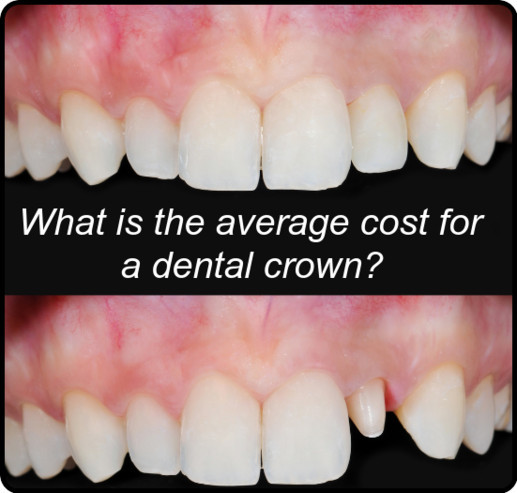What is the average cost for a dental crown
What is the average cost for a dental crown is a great question for people that have damaged teeth and need treatment.
The cost of dental crowns in Ireland can vary significantly, if you need more than one dental crown then it’s worth spending the time researching what is the average cost for a dental crown in Ireland.
I must mention that there are considerable savings to be made on the price of dental crowns by going to a dental destination like Hungary.
In Hungary savings of up to 60% can be made on the cost of dental crowns even after you factor in flights, accommodation and food, to get a free consultation and quotation for dental crowns contact us.

Why dental crowns
Dental crowns are the ideal solution in a situation where teeth have become damaged over time due to perhaps tooth decay, over use or an injury, basically a dental crown is shaped like a tooth.
It’s like a cap that is placed over a damaged tooth, it fits like a glove and restores the appearance, size, shape and strength of the tooth.
A dental crown is fixed permanently using dental cement, it covers the part of the tooth that is visibly above the gum line.
Are you a candidate for dental crowns
I’m assuming that because you want to know what is the average cost for a dental crown that you are a candidate for dental crowns, there are a number of reasons why you would need a dental crown:
- You may want to protect a tooth that has weakened because of decay
- You may need to stop a weak tooth from breaking
- You may want to prevent any further cracking in a weak tooth
- You may need to hold a dental bridge in position
- You may want to cover an implant
- You may have had root canal treatment and need to cover a tooth
- You may need to cover a discoloured or misshaped tooth
- You may want to restore a severely worn down or broken tooth
What are 3/4 crowns and inlays
Nowadays the choice of dental crowns is bigger than ever before so when people ask what is the average cost for a dental crown the type of dental crown must be considered, 3/4 crowns and onlays are models of dental crowns that are unlike traditional crowns because they don’t cover over the entire tooth.
This type of dental crown are appropriate where there is still a solid amount of tooth structure, in modern dentistry a 3/4 crown or inlay is considered a more straightforward way compared to a traditional dental crown that fits completely over the tooth.
During this procedure the dentist will remove the damaged area and perform a tooth reshape to take the new crown.
What materials are dental crowns made from?
Permanent dental crowns are made from very individual and distinct materials, these may include:
Porcelian-fused-to-metal: A porcelain fused to metal dental crown can be made into an exact match of the colour of your teeth.
So they will look like a more natural tooth, normally used for front or back teeth porcelain fused to metal can have some drawbacks.
For example, there is a small chance that the porcelain part of the crown may chip or break off, this can cause wear and tear on the opposite teeth, secondly the metal bit to which the porcelain is fused to can in some cases show up as a dark line.
Metal crowns: Metal crowns are available in a range that includes nickel, gold, chromium, and gold, the beauty of metal crowns is that they never or rarely chip or break.
They are the longest lasting in terms of wearing down and you only need to have a small portion of the damaged tooth removed.
Resin crowns: Resin crowns are built from resin, in general they cost less than the other types of dental crowns, unlike porcelain or metal they can wear down over time, there is also the chance that they might break.
All ceramic or all porcelain crowns: All ceramic or all porcelain crowns are very good for providing the best possible match to natural teeth compared to other crown choices.
The downside is they aren’t as tough as metal or porcelain fused to metal, all ceramic are a good option for restoring front teeth.
As I’ve outlined the answer to what is the average cost for a dental crown boils down to the type of dental crown used and crucially where you go to have the procedure done.
Pressed ceramic crowns: A pressed ceramic crown has a tough inside core, they are used as a replacement for the metal liner like the one used during the all ceramic process.
A pressed ceramic crown is porcelain capped to provide the best possible colour match, pressed ceramic will last longer than all porcelain

Dental crowns-a price comparison
The price of dental crowns in Ireland can vary from a quality Zirconia crown costing from €500 up to €900, a porcelain crown fused to metal can cost from €350 up to €800, a temporary crown can cost from €30 up to €150.
These costs may seem small if only one or a few are needed, however the costs mount up considerably if you need a full mouth restoration procedure that could include 14 top and 14 bottom dental crowns.
For example take a popular crown like Zirconia, if someone needed say 14 top and 14 bottom of those at the lowest price of €500 per crown it amounts to €14,000.
Dental crowns prices Ireland
| Crowns | ||
| Core/Post (if needed) | €259 | |
| Porcelain crown (fused to metal) | €670 | |
| Zirconia crown | €780 |
Zirconia Crown from €500. Dental Crowns €350 – €600 Temporary Crown €30 – €50. Porcelain Crown from €550 PFM Crown from €350
Zirconia Crown from €900 Dental Crowns €550 – €850 Temporary Crown €150 – €200 Gold Crown from €800 Porcelain Crown €700 – €800 PFM Crown from €350
What is the procedure
When searching for what is the average cost for a dental crown its important to know what is the procedure, in a typical case there are two visits to the dental clinic.
Initially of course a consultation will have taken place to ascertain if the patient is a good candidate for dental crowns.
The first visit
The first visit will involve some work on the tooth or teeth that will be fitted with dental crowns, xrays will be taken of the teeth and surrounding bone, the teeth will be examined and prepared, in some cases root canal treatment may be needed because of:
- A risk of infection
- Decayed teeth
- An injury to the tissue connecting the gum and tooth
The teeth that will receive the dental crowns will typically need to be reduced down by filing across the top and down the sides, this is needed to make room for the crown to fit on top, the amount of filing will vary depending on what type of crown is chosen.
Metal dental crowns tend to be slimmer than porcelain-fused-to-metal-crowns or all porcelain so they won’t need as much filing, in case where there isn’t enough tooth it can be built up using a filling material.
Once the tooth or teeth are reshaped a putty or paste is utilized to make an impression of the tooth or teeth that will have a crown put over it, an impression is also taken of the teeth below and above the designated crown tooth so that your bite isn’t affected.
The impressions are brought to the dental laboratory, a dental technician will use the impressions to make the dental crowns.
While you wait for this to happen the dentist will fit a temporary crown so that you can chew and eat your food.
At Hungarian Dental Implant Centre Wexford should you decide to visit our state-of-the-art clinic in Hungary those dental crowns will be made and fitted in the same week at considerably less cost.
Why not get a comparison on what is the average cost for a dental crown in Ireland versus the savings that you can make by getting the same procedure done in Hungary, contact us on 0873490104 to book a free consultation.

Your second visit
On your second visit the dental crown or crowns are ready for placement on your teeth, your temporary crown will be removed, the permanent crown or crowns are fitted and checked.
In some cases a local anesthetic may be used to numb the area as the new dental crown is fixed into place with cement.
Pros and cons of dental crowns
Just like any other procedure there are pros and cons, when looking at what is the average cost for a dental crown its important to know the pros and cons
The pros of dental crowns are many, for example
- No surgery needed
- A choice of dental crowns
- Ideal protection for weakened teeth
- Recommended for broken or chipped teeth
- Natural looking
- Same colour as normal teeth
- Long lasting
- Permanent solution
The cons of dental crowns
- Covered teeth may be sensitive after the procedure
- Some crowns may chip after a while
- Some may cause an allergic reaction
- A dark line may appear on the gum line with some crowns
- Crowns can fall off if not fitted properly
- Crowns can loosen
How long to should crowns last
A well fitted dental crown should last 5-15 years, the length of time they last depends largely on the amount of wear and tear that they are exposed to.
Also how well you pay attention to personal mouth related habits like teeth grinding, biting fingernails, chewing ice, using teeth to open something with and how well you practice good oral hygiene.
Conclusion
I sincerely hope that you are now more informed on what is the average cost for a dental crown, typically a porcelain crown will cost more than a gold crown, gold crowns usually cost more than porcelain-fused-to-metal-crown.
Generally speaking the popular Zirconia crowns can cost between €500 to €900 here in Ireland, the good news is you have an alternative.
Why not contact us at Hungarian Dental Implant Centre Wexford for a free quotation on dental crowns, I’m sure we can help you to bring down what is the average cost for a dental crown in Ireland.
We can also help with the price of full mouth implants.
Reference
https://www.ncbi.nlm.nih.gov/pmc/articles/PMC5086281/
.



